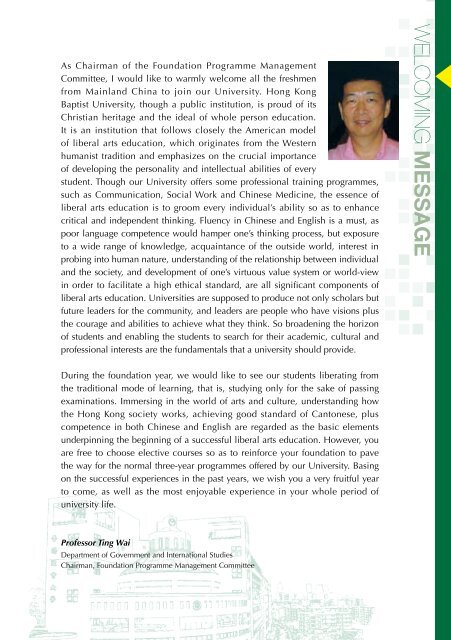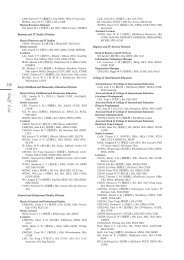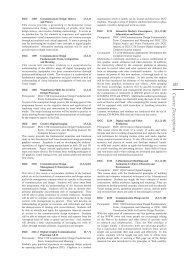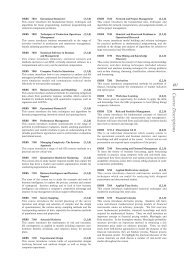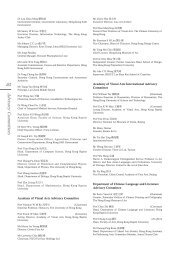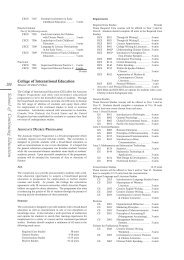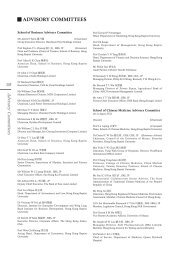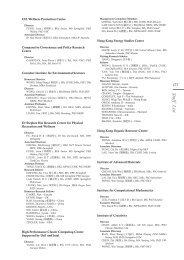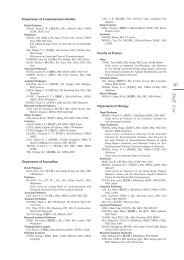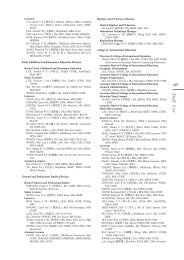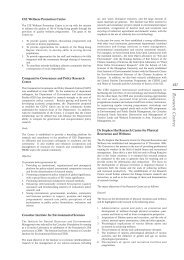WELCOMING MESSAGE - Academic Registry - Home - Hong Kong ...
WELCOMING MESSAGE - Academic Registry - Home - Hong Kong ...
WELCOMING MESSAGE - Academic Registry - Home - Hong Kong ...
You also want an ePaper? Increase the reach of your titles
YUMPU automatically turns print PDFs into web optimized ePapers that Google loves.
As Chairman of the Foundation Programme Management<br />
Committee, I would like to warmly welcome all the freshmen<br />
from Mainland China to join our University. <strong>Hong</strong> <strong>Kong</strong><br />
Baptist University, though a public institution, is proud of its<br />
Christian heritage and the ideal of whole person education.<br />
It is an institution that follows closely the American model<br />
of liberal arts education, which originates from the Western<br />
humanist tradition and emphasizes on the crucial importance<br />
of developing the personality and intellectual abilities of every<br />
student. Though our University offers some professional training programmes,<br />
such as Communication, Social Work and Chinese Medicine, the essence of<br />
liberal arts education is to groom every individual’s ability so as to enhance<br />
critical and independent thinking. Fluency in Chinese and English is a must, as<br />
poor language competence would hamper one’s thinking process, but exposure<br />
to a wide range of knowledge, acquaintance of the outside world, interest in<br />
probing into human nature, understanding of the relationship between individual<br />
and the society, and development of one’s virtuous value system or world-view<br />
in order to facilitate a high ethical standard, are all significant components of<br />
liberal arts education. Universities are supposed to produce not only scholars but<br />
future leaders for the community, and leaders are people who have visions plus<br />
the courage and abilities to achieve what they think. So broadening the horizon<br />
of students and enabling the students to search for their academic, cultural and<br />
professional interests are the fundamentals that a university should provide.<br />
<strong>WELCOMING</strong> <strong>MESSAGE</strong><br />
During the foundation year, we would like to see our students liberating from<br />
the traditional mode of learning, that is, studying only for the sake of passing<br />
examinations. Immersing in the world of arts and culture, understanding how<br />
the <strong>Hong</strong> <strong>Kong</strong> society works, achieving good standard of Cantonese, plus<br />
competence in both Chinese and English are regarded as the basic elements<br />
underpinning the beginning of a successful liberal arts education. However, you<br />
are free to choose elective courses so as to reinforce your foundation to pave<br />
the way for the normal three-year programmes offered by our University. Basing<br />
on the successful experiences in the past years, we wish you a very fruitful year<br />
to come, as well as the most enjoyable experience in your whole period of<br />
university life.<br />
Professor Ting Wai<br />
Department of Government and International Studies<br />
Chairman, Foundation Programme Management Committee
H<br />
AN O<br />
D<br />
B K<br />
FOR FOUNDATION STUDENTS 2011/2012
Programme and Course Information<br />
1.1 Curriculum and Study Schedule........................................... 04<br />
1.2 Course Description.............................................................. 06<br />
1.3 Qualifying Test for English Language Courses....................... 09<br />
1.4 English Bridging Course....................................................... 10<br />
General Regulations for Foundation Programme &<br />
Related Information<br />
2.1 <strong>Academic</strong> Regulations Governing the Studies of<br />
Foundation Programme........................................................ 11<br />
2.2 Completion of Foundation Programme................................. 11<br />
2.3 Course Exemption................................................................ 12<br />
2.4 Change of Study Programme................................................ 13<br />
2.5 University Information System.............................................. 13<br />
TABLE OF CONTENTS<br />
Frequently Asked Questions<br />
3.1 Course Registration.............................................................. 14<br />
3.2 Class Attendance.................................................................. 14<br />
3.3 Scholarship.......................................................................... 15<br />
3.4 Visa Extension...................................................................... 16<br />
3.5 Internship / Part-time Job...................................................... 16<br />
Other Information<br />
4.1 <strong>Academic</strong> Calendar 2011/2012............................................ 20<br />
4.2 Useful Contacts.................................................................... 22<br />
4.3 Campus Maps and Building Codes....................................... 24
H<br />
AN O<br />
D<br />
B K<br />
FOR FOUNDATION STUDENTS 2011/2012<br />
Programme and Course Information<br />
1.1 Curriculum and Study Schedule<br />
(a) Science Foundation Programme (for students admitted to Bachelor of Science<br />
programmes)<br />
Semester 1<br />
Units<br />
ACEP0010 Arts and Culture 3<br />
LANG0131 Guangdonghua I 1<br />
LANG0150 # English Listening & Speaking (Upper-Intermediate) 3<br />
LANG0170 # Integrated English (Upper-Intermediate) 3<br />
MATH0021 Mathematics for Science I 3<br />
PHYS1121 General Physics I 3<br />
SCE 0020 Understanding <strong>Hong</strong> <strong>Kong</strong>: Society and Culture 3<br />
Semester Total: 19<br />
Semester 2<br />
Units<br />
BIOL0010 Invitation to Biology 3<br />
CHEM0010 Foundation of Chemistry 3<br />
I.T.1180 Information Management Technology 3<br />
LANG0132 Guangdonghua II 1<br />
LANG0160 # English Listening & Speaking (Advanced) 3<br />
LANG0180 # Integrated English (Advanced) 3<br />
MATH0022 Mathematics for Science II 3<br />
Semester Total: 19<br />
Programme Total#: 38<br />
# Students passing the Qualifying Test for English Language Courses @ will be exempted from<br />
LANG0150 and LANG0170, and will be required to take the two Semester 2 English language<br />
courses (LANG0160 and LANG0180) in Semester 1.<br />
Students completing LANG0160 and LANG0180 in Semester 1 will be required to take 1 – 2<br />
elective course(s) (i.e. 3 – 6 units) in Semester 2 to make up for a total of not less than 35 units<br />
for the programme.<br />
@<br />
Please refer to Section 1.3 for detailed information about the Qualifying Test for English<br />
Language Courses.<br />
4
(b) Non-Science Foundation Programme (for students admitted to programmes<br />
other than the Bachelor of Science programmes)<br />
Semester 1<br />
Units<br />
ACEP0010 Arts and Culture 3<br />
COMP0010 A Gateway to Computer Science 3<br />
LANG0131 Guangdonghua I 1<br />
LANG0150 # English Listening & Speaking (Upper-Intermediate) 3<br />
LANG0170 # Integrated English (Upper-Intermediate) 3<br />
MATH0011 Mathematics for Non-Science I 3<br />
SCE 0020 Understanding <strong>Hong</strong> <strong>Kong</strong>: Society and Culture 3<br />
Semester Total: 19<br />
Semester 2<br />
Units<br />
LANG0132 Guangdonghua II 1<br />
MATH0012 Mathematics for Non-Science II 3<br />
LANG0160 # English Listening & Speaking (Advanced) 3<br />
LANG0180 # Integrated English (Advanced) 3<br />
2 to 3 Elective Courses # 6 – 9<br />
Semester Total: 16-19<br />
Programme Total: 35-38<br />
# Students passing the Qualifying Test for English Language Courses @ will be exempted from<br />
LANG0150 and LANG0170, and will be required to take the two Semester 2 English language<br />
courses (LANG0160 and LANG0180) in Semester 1.<br />
Students completing LANG0160 and LANG0180 in Semester 1 will be required to take 2<br />
additional elective courses (i.e. 6 units) in Semester 2 to make up for a full study load. That is,<br />
students need to take a total of 4–5 elective courses in Semester 2 to satisfy the total units (35 –<br />
38) required for the programme.<br />
@<br />
Please refer to Section 1.3 for detailed information about the Qualifying Test for English<br />
Language Courses.<br />
5
H<br />
AN O<br />
D<br />
B K<br />
FOR FOUNDATION STUDENTS 2011/2012<br />
1.2 Course Description<br />
ACEP0010 Arts and Culture (3,3,0)<br />
This is a project-based cum experiential course, supplemented by weekly threehour<br />
lectures or workshops. The practicum part, besides three to four visits to<br />
artistic performances followed mostly by post-performance discussions with the<br />
auteurs, consists mainly of an intensive socio-cultural field study project in groups<br />
of three. The projects, led by various district councillors and social workers, focus<br />
on thought-provoking social topics in the urban areas of <strong>Hong</strong> <strong>Kong</strong>.<br />
Toward the end of semester, the findings of the 50 or so field projects will be<br />
presented in 6 parallel sessions. These findings, duly critiqued by experts and<br />
fellow students, are to be written up formally. These reports, together with the field<br />
efforts, log entries and the oral presentation, will be counted as part of the final<br />
assessment. Some class hours will be devoted to training the students in field study<br />
techniques and others to expanding on the benefits derived from the practical<br />
undertakings. Some other gatherings will focus on matters related to or arising<br />
from the visits to artistic performances.<br />
The course is intended to be writing-intensive, where learning-through-writing will<br />
be practiced.<br />
BIOL0010 Invitation to Biology (3,3,0)<br />
This course is intended for students who need a broad background in biology. Each<br />
student will learn the major principles and mechanisms in the biological sciences<br />
as background for pursuing BSc degree in Biology.<br />
CHEM0010 Foundation of Chemistry (3,3,0)<br />
This is intended to be the first chemistry course for all Science Majors in the<br />
Foundation programme. It is aimed to provide these students with a solid<br />
understanding of some fundamental concepts and physical principles in chemistry.<br />
The topics discussed include theories of atomic and molecular structures, chemical<br />
bonding, intermolecular forces and states of matter, acid-base chemistry and<br />
functional group chemistry of some organic compounds.<br />
6
COMP0010 A Gateway to Computer Science (3,2,1)<br />
(for Non-Science Students)<br />
This course is designed for the foundation programme students only. No<br />
experience with computers is assumed. The aim is to teach students the<br />
fundamentals of computers, particularly with respect to personal computer<br />
hardware and software, and the World Wide Web. Students will finish the course<br />
with a solid understanding of computer principles, how to use computers, and<br />
how to access information on the World Wide Web. Particularly, students will gain<br />
hands-on experience on using common software packages.<br />
I.T.1180 Information Management Technology (3,2,1)<br />
(for Science Students)<br />
This course is designed for the leaders of tomorrow. Its special aim is to prepare<br />
students for the challenges of tomorrow’s workplace by equipping them with<br />
practical knowledge and skills to engage in fast-moving information technology<br />
(IT). Its main thrust is the incorporation of essential as well as tailor-made, forwardlooking<br />
IT concepts illustrated with real-world examples and coupled with handson<br />
experiences in the support of the information management cycle.<br />
LANG0131-2 Guangdonghua I - II 粵 語 ( 一 ) - ( 二 ) (1,2,0)<br />
本 課 程 為 大 學 本 科 先 修 班 的 基 礎 課 程 , 專 為 以 普 通 話 為 母 語 的 學 生 而 設 。 本 科 理 論 與<br />
實 踐 並 重 , 通 過 音 標 及 粵 普 對 照 , 循 序 漸 進 為 學 生 初 步 提 供 有 系 統 的 廣 州 話 聽 、 讀 、<br />
講 的 訓 練 , 從 而 提 高 廣 州 話 的 整 體 應 用 能 力 。<br />
LANG0150 English Listening and Speaking (Upper-Intermediate) (3,3,0)<br />
This upper-intermediate English listening and speaking course aims at raising<br />
students’ awareness of different genres and styles of authentic speech, and<br />
improving their proficiency in English listening and speaking. The course adopts<br />
a communicative approach and students will develop language skills through a<br />
variety of activities including watching news reports, watching films, role-play,<br />
small group discussion, reading poems etc. The topics selected are interesting,<br />
informative and universal and cover a wide range of areas including politics,<br />
economics, science, entertainments, etc.<br />
7
H<br />
AN O<br />
D<br />
B K<br />
FOR FOUNDATION STUDENTS 2011/2012<br />
LANG0160 English Listening and Speaking (Advanced) (3,3,0)<br />
The advanced English listening and speaking course aims to raise students’<br />
awareness of different genres and styles of authentic speech and to improve<br />
students’ proficiency in English listening and speaking, with advanced-level<br />
materials and more challenging tasks. Students will get ample opportunities to<br />
practice these skills in an integrated manner and develop the skills through a<br />
variety of activities, including listening to academic lectures and documentaries,<br />
watching videos and films, role-play, small group discussion, delivering a formal<br />
speech, and giving an academic presentation. The topics selected cover a range of<br />
media and sources.<br />
LANG0170 Integrated English (Upper-Intermediate) (3,3,0) and<br />
LANG0180 Integrated English (Advanced) (3,3,0)<br />
These two courses form a complete project of integrated English specially designed<br />
for Foundation students from Mainland China, with the upper-intermediate course<br />
offered in the first semester and the advanced course in the second semester of<br />
their foundation year. The courses aim at helping students acquire the competence<br />
to use English more effectively for real life communications and academic<br />
development in <strong>Hong</strong> <strong>Kong</strong>. They provide English language practice in all four<br />
skills of reading, listening, speaking and writing, with a focus on reading and<br />
writing, in context of topics of global interests; and engage students in tasks which<br />
help develop an intercultural awareness.<br />
MATH0011-2 Mathematics for Non-Science I - II (3,3,0)<br />
This course is designed for the pre-university studies of students who have<br />
graduated from secondary schools in the Mainland China. The contents of this<br />
course provide students the necessary knowledge of mathematics for their firstyear<br />
studies in universities in <strong>Hong</strong> <strong>Kong</strong>.<br />
MATH0021-2 Mathematics for Science I - II (3,3,0)<br />
This course aims at introducing basic ideas and techniques in advanced<br />
mathematics for students who have to use mathematics, especially calculus<br />
and statistics, in their university studies; developing students’ ability in proving<br />
theorems; and enhancing students’ logical thinking. After taking this course,<br />
students are expected to master the foundation of advanced mathematics.<br />
8
PHYS1121 General Physics I (3,3,0)<br />
This course covers classical mechanics and thermodynamics at an introductory<br />
level. After a brief review of Newton’s three laws, a number of applications<br />
illustrating the use of conservation laws and calculus are discussed. This is<br />
followed by an elementary treatment of rigid body and fluid mechanics. The<br />
last part deals with thermal phenomena and the use of statistical concepts in<br />
describing the gaseous state.<br />
SCE 0020 Understanding <strong>Hong</strong> <strong>Kong</strong>: Society and Culture (3,3,0)<br />
Many non-local students who come to study in the local universities do not often<br />
come prepared with an adequate knowledge about <strong>Hong</strong> <strong>Kong</strong>. The focus of<br />
this course is in stressing the importance of promoting a general understanding<br />
about the major aspects of the <strong>Hong</strong> <strong>Kong</strong> society. Through lectures, video,<br />
presentation and field visits, the study will enable students to make better sense<br />
of their surroundings and the context wherein they come to live and learn. Upon<br />
successful completion of the course, students should be able to have a basic<br />
understanding of the society of <strong>Hong</strong> <strong>Kong</strong> with particular reference to its sociocultural<br />
developments since 1997; and an appreciation and awareness of the<br />
distinctive ways of life of the <strong>Hong</strong> <strong>Kong</strong> Chinese.<br />
1.3 Qualifying Test for English Language Courses<br />
According to the programme curriculum, Foundation Students are required to take<br />
the following 4 English language courses:<br />
LANG0150 English Listening & Speaking (Upper-Intermediate)<br />
LANG0160 English Listening & Speaking (Advanced)<br />
LANG0170 Integrated English (Upper-Intermediate)<br />
LANG0180 Integrated English (Advanced)<br />
Students who possess a certain level of English language proficiency may be<br />
exempted from taking LANG0150 and LANG0170. The Language Centre will<br />
arrange an optional Qualifying Test for English Language Courses in August.<br />
Foundation students may choose to take the examination and if they pass it, they<br />
will be exempted from these two language courses.<br />
Foundation students will be invited to take the Qualifying Test and have to make<br />
applications to the <strong>Academic</strong> <strong>Registry</strong> by a deadline, normally before their arrival<br />
to <strong>Hong</strong> <strong>Kong</strong>.<br />
9
H<br />
AN O<br />
D<br />
B K<br />
FOR FOUNDATION STUDENTS 2011/2012<br />
1.4 English Bridging Course<br />
It is University policy that all first-year undergraduate students without Grade D or<br />
above in AS Use of English or equivalent qualifications@ are required to take the<br />
English Bridging Course (EBC) before commencement of their Year I studies.<br />
Foundation Students who have attained Grade C+ or above for BOTH advanced<br />
level English language courses (LANG0160 and LANG0180) in the Foundation<br />
Programme will be exempted from the English Bridging Course.<br />
@<br />
The University accepts the following qualifications as equivalent to Grade D in AS Use of<br />
English:<br />
a) A score of 550 (paper-based) or 213 (computer-based) or 80 (Internet-based) or above in TOEFL; or<br />
b) A score of 7 or above in IELTS, <strong>Academic</strong> Level; or<br />
c) Grade D or above in GCE AS Level or AL English; or<br />
d) Grade C or above in GCE O Level/GCSE/IGCSE English; or<br />
e) Score 4 or above out of 7 in IB English A1 or A2.<br />
10
General Regulations for Foundation Programme & Related Information<br />
2.1 <strong>Academic</strong> Regulations Governing the Studies of Foundation<br />
Programme<br />
Foundation Students will receive a copy of the Calendar / Bulletin in compact disk<br />
format during Orientation and before commencement of studies. Information such<br />
as the academic calendar, general regulations, programme curriculums, course<br />
descriptions, fees and charges, scholarships and financial aid etc. are covered<br />
in the Calendar / Bulletin. Though the Calendar / Bulletin contains information<br />
for degree programmes, the General Regulations for Undergraduate Degree<br />
Programmes, in general, are applicable to the Foundation Programme. Students<br />
are therefore strongly advised to look at the regulations stated in the Calendar /<br />
Bulletin.<br />
The Calendar / Bulletin is also available at the <strong>Academic</strong> <strong>Registry</strong> website at:<br />
http://buar.hkbu.edu.hk/ .<br />
2.2 Completion of Foundation Programme<br />
To satisfactory complete the Foundation Programme and progress to undergraduate<br />
programme, students are required to:<br />
(i) obtain the total number of units required and pass all courses stipulated by the<br />
programme (refer to Section 1.1); and<br />
(ii) attain a cumulative GPA of 2.00 or above for all courses attempted.<br />
2.2.1 Progression to Undergraduate Studies<br />
Upon successful completion of the Foundation Programme, students will<br />
progress to undergraduate degree programmes which they have been admitted<br />
to in September of the following academic year.<br />
2.2.2 <strong>Academic</strong> Problems<br />
Students with poor academic results will be given academic warning /<br />
academic probation at the end of a semester if their GPA falls into the<br />
following categories:<br />
11
H<br />
AN O<br />
D<br />
B K<br />
FOR FOUNDATION STUDENTS 2011/2012<br />
<strong>Academic</strong> Warning : Applicable to students with semester GPA between 1.70<br />
and 1.99 for a given semester.<br />
<strong>Academic</strong> Probation : Applicable to students with semester GPA below 1.70<br />
for a given semester.<br />
<strong>Academic</strong> Dismissal : As required by the Senate when the student’s semester<br />
GPA is below 1.70 for two consecutive semesters, or<br />
on other academic grounds.<br />
At the discretion of individual Department/Programme, students with poor<br />
academic performance may be required to repeat the Foundation Programme<br />
or to terminate their studies at the University.<br />
2.2.3 Dismissal<br />
The University may at any time require any student to terminate his/her studies<br />
at the University either on academic or disciplinary grounds, or on other<br />
grounds deemed as appropriate.<br />
The University may also dismiss a student whose conduct or general influence<br />
is considered harmful to the institution. Such a student will normally not be<br />
considered for re-admission.<br />
2.3 Course Exemption<br />
2.3.1 LANG1491 English I<br />
All undergraduate students are required to take English I (LANG1491).<br />
Foundation Students who have attained Grade A- or above for BOTH advanced<br />
level English language courses (LANG0160 and LANG0180) in the Foundation<br />
Programme will be granted exemption from LANG1491, and are recommended<br />
to take one of the following courses as substitution of LANG1491:<br />
LANG2140 Language Use and Communication: Theory and Practice<br />
LANG2210 Advanced English Pronunciation<br />
LANG2220 English through Current Events<br />
LANG2230 Advanced Listening in English<br />
2.3.2 Other Undergraduate Level Courses<br />
Foundation Students who have attained a Grade C or above for any<br />
undergraduate level courses (level one and above courses) in the Foundation<br />
Programme will be exempted from these courses during their undergraduate<br />
studies.<br />
12
Students are not allowed to retake these exempted courses during their<br />
undergraduate studies, and are required to replace them with other courses to<br />
make up for the units being exempted. These exempted courses will be shown<br />
in the Transcript of <strong>Academic</strong> Record for undergraduate studies with a remark<br />
“EX” (exempted), and will not be included in GPA calculation.<br />
2.4 Change of Study Programme<br />
Once admitted to a certain study programme, students are normally not allowed<br />
to change to other undergraduate degree programmes. Special approval, however,<br />
may be given by some Schools/Faculties for students to apply for Change of Study<br />
Programme within their respective School/Faculty. The <strong>Academic</strong> <strong>Registry</strong> will<br />
notify Foundation Students of the application procedures around April each year.<br />
2.5 University Information System<br />
The University Information System (UIS) allows students to access their personal<br />
data and study related information through an account and password. Students<br />
can access the following information through UIS:<br />
(a) Personal Particulars<br />
(b) Enrolment Records<br />
(c) Class and Examination Timetable<br />
(d) Examination Information<br />
(e) Transcript of <strong>Academic</strong> Record<br />
(f) Finance (such as tuition payment notification)<br />
Foundation Students will receive their UIS login password via the University email<br />
account after arrival to <strong>Hong</strong> <strong>Kong</strong>.<br />
13
H<br />
AN O<br />
D<br />
B K<br />
FOR FOUNDATION STUDENTS 2011/2012<br />
Frequently Asked Questions<br />
3.1 Course Registration<br />
Q3.1.1 How can I register on courses<br />
You will automatically be registered on courses which are required by the<br />
Foundation Programme. For registration of elective courses in Semester 2, you<br />
will be notified of the procedures by the <strong>Academic</strong> <strong>Registry</strong> around October.<br />
Q3.1.2 Where can I find the elective courses available for my selection<br />
The <strong>Academic</strong> <strong>Registry</strong> will, in October, upload the information of available<br />
elective courses to a website and invite you to select elective course(s) via an<br />
on-line system.<br />
Q3.1.3 Can I add/drop courses after commencement of classes<br />
Since all courses in Semester 1 are required courses, you do not need to<br />
add/drop courses in Semester 1 of the Foundation Programme. Adding and<br />
dropping of courses for Semester 2, however, may be allowed during the first<br />
two weeks of classes. You will be notified of the detailed procedures by the<br />
<strong>Academic</strong> <strong>Registry</strong> in due course.<br />
3.2 Class Attendance<br />
Q3.2.1 Must I attend all scheduled classes of the courses<br />
Yes, you are expected to attend all scheduled classes for which you have<br />
registered. If absence is due to conditions beyond your control and you wish<br />
to establish that fact in order to justify make-up work (e.g. papers, assignments),<br />
a written explanation together with supporting documents must be presented<br />
to the course instructor for approval.<br />
Q3.2.2 What is the consequence for late for class(es) or absence from class(es)<br />
If you are more than 15 minutes late for a class, you may be counted as absent.<br />
If you are reported:<br />
(a) to have been absent without approval for more than 15 percent of<br />
scheduled classes, or<br />
(b) to have attended less than 70 percent of scheduled classes (with approved<br />
and unapproved absences)<br />
14
you shall receive a Grade F for the course. You will not be allowed to sit for<br />
the course examination, if any.<br />
Q3.2.3 Should I attend the scheduled class(es) in case of typhoon or bad weather<br />
Normally, classes will be cancelled upon hoisting of Typhoon Signal No. 8 or<br />
above or issuance of Black Rainstorm Warning Signal. You should take note of<br />
the "Arrangement of Classes During Typhoon Signal No. 8 or Black Rainstorm<br />
Warning Signal" which can be found on the <strong>Academic</strong> <strong>Registry</strong> website at<br />
http://buar.hkbu.edu.hk .<br />
3.3 Scholarship<br />
Q3.3.1 Do I need to apply for renewal of my admission scholarship<br />
Admission Scholarship for mainland students is, in general, tenable for four<br />
years including the foundation year of study. Renewal of scholarship is subject<br />
to students’ satisfactory academic results. The scholarship award will be<br />
renewed automatically if you attain a GPA of 3.00 or above in every semester.<br />
Q3.3.2 Will my admission scholarship be terminated if my academic<br />
performance is not good<br />
As renewal of scholarship is subject to students’ satisfactory academic results,<br />
the University may discontinue / terminate your scholarship award if you fail to<br />
attain a semester GPA of 3.00 or above each year.<br />
Q3.3.3 Am I still eligible for my admission scholarship after successful<br />
application for change of study programme<br />
You are still eligible for your admission scholarship if your new study<br />
programme is within the original School/Faculty/Academy. However, if<br />
your new study programme is under another School/Faculty/Academy, your<br />
admission scholarship will be ceased.<br />
Q3.3.4 Are there any scholarships available for application during my<br />
undergraduate studies<br />
There are a number of scholarships available for application of undergraduate<br />
students each year. Students with outstanding academic results may also be<br />
nominated for some of the scholarships, fellowships and prizes. Detailed<br />
information such as application deadlines, eligibility and award criteria is<br />
available at the Office of Student Affairs website at http://sa.hkbu.edu.hk/ .<br />
15
H<br />
AN O<br />
D<br />
B K<br />
3.4 Visa Extension<br />
FOR FOUNDATION STUDENTS 2011/2012<br />
Q3.4.1 When should I extend my student visa<br />
Your visa / entry permit label for studying in <strong>Hong</strong> <strong>Kong</strong> issued by the<br />
Immigration Department of the HKSAR is normally on a yearly basis or in<br />
accordance with the duration of your studies (whichever is shorter). You should<br />
apply for extension of stay to study in <strong>Hong</strong> <strong>Kong</strong> within 4 weeks before the<br />
limit of stay expires.<br />
Q3.4.2 How can I extend my student visa<br />
You should submit your application, together with the required documents,<br />
to the Immigration Department of the HKSAR (The Quality Migrants and<br />
Mainland Residents Section, Immigration Department, 6/F, Immigration Tower,<br />
7 Gloucester Road, Wan Chai, <strong>Hong</strong> <strong>Kong</strong>) in person 4 weeks before the limit<br />
of stay expires. If you wish to authorize in writing a representative to submit<br />
the application, you must also be physically in <strong>Hong</strong> <strong>Kong</strong> on the date of<br />
submission and on the date of collection of the visa label.<br />
For further information of visa extension matters, please visit the website of<br />
the Immigration Department of the HKSAR at: http://www.immd.gov.hk/<br />
index.html and read the information there under FAQs > Immigration Policy<br />
on Study. You may also wish to contact the Immigration Department via the<br />
enquiry hotline at Tel: (852) 2824-6111.<br />
3.5 Internship / Part-time Job<br />
Q3.5.1 Can I work in <strong>Hong</strong> <strong>Kong</strong> during my foundation year of study<br />
As a non-local student, you are not permitted to take up any employment<br />
(whether paid or unpaid) during your foundation year of study. However,<br />
after your progression to the full-time undergraduate studies, you may take<br />
up internship Note 1 , part-time on-campus employment Note 2 , and employment<br />
during the summer months Note 2 under the relaxed employment restriction for<br />
non-local students.<br />
Notes:<br />
(1) After the relaxation of the Immigration Regulations from the 2008/09 academic year, nonlocal<br />
students (including mainland students) of full-time, locally accredited programmes<br />
at degree level or above whose study period is not less than one academic year may take<br />
up internship subject to the following conditions:<br />
16
(a) The internships must be study/curriculum-related and be arranged or endorsed by<br />
the institutions they are studying in; and<br />
(b) The duration of the internship is up to one academic year, or one-third of the normal<br />
duration of the relevant full-time academic programme, whichever is the shorter.<br />
There is no restriction on the nature of work, level of salary, location, number of working<br />
hours and employers.<br />
(2) Moreover, these students (excluding exchange students) may take up:<br />
(a) part-time on-campus employment for not more than 20 hours per week throughout<br />
the year; and<br />
(b) employment during the summer months without any limit in relation to work hours<br />
and location.<br />
Q3.5.2 I understand that I would be benefited from the relaxation of<br />
employment restriction (refer to Q3.5.1 for details). Should I make<br />
separate application before taking up internship, part-time on-campus<br />
employment and summer employment after my progression to the<br />
undergraduate studies<br />
Non-local students who benefit from the relaxation (“eligible students”) will<br />
be notified of the relaxation individually by a "No Objection Letter" (NOL)<br />
upon approval of entry and extension of stay applications. The NOL will spell<br />
out the type(s) and conditions of employment which the student may take<br />
up. The NOLs will be issued to the eligible students through their sponsors/<br />
representatives or in person as appropriate upon issue of the student visas/<br />
entry permits or granting extension of stay to the students. There is no need for<br />
eligible students to make separate application in respect of study/curriculumrelated<br />
internship, part-time on-campus employment and summer employment.<br />
For further information about employment during your studies, please visit the<br />
website of the Immigration Department of the HKSAR at: http://www.immd.<br />
gov.hk/index.html and read the information there under FAQs > Immigration<br />
Policy on Study. You may also wish to contact the Immigration Department via<br />
the enquiry hotline at Tel: (852) 2824-6111.<br />
17
H<br />
AN O<br />
D<br />
B K<br />
FOR FOUNDATION STUDENTS 2011/2012<br />
18
OTHER INFORMATION<br />
2011-2012<br />
19
ACADEMIC CALENDAR<br />
4.1: <strong>Academic</strong> Calendar 2011-2012<br />
2011-2012<br />
29/7-1/8 Enrolment (New Undergraduate Students)<br />
3-11 New Student Orientation and<br />
University Life Workshops<br />
15-16 Online Course Registration<br />
(New Undergraduate Students)<br />
17-30 English Bridging Course<br />
29-31 International Student Orientation<br />
1 <strong>Academic</strong> Year Begins<br />
1 First Semester Begins<br />
1 New Faculty and Staff Orientation<br />
2 First Semester Classes Begin<br />
2 Trimester I Classes Begin<br />
2 MBA Module I Classes Begin<br />
2 First Day to Add/Drop Courses (1 st Semester)<br />
2 First Day to Add/Drop Courses (Trimester I)<br />
2 First Semester Tuition Payment Due Date<br />
(Returning Students)<br />
2 Trimester I Tuition Payment Due Date<br />
6 56 th Convocation and Honorary University<br />
Fellowship Conferment Ceremony<br />
13 The Day Following Mid-Autumn Festival<br />
14 Continuing Education School Board Meeting<br />
16 Last Day to Add/Drop Courses (1 st Semester)<br />
16 Last Day to Add/Drop Courses (Trimester I)<br />
26 Senate Meeting<br />
1 National Day<br />
2-8 Christian Emphasis Week<br />
3 Arts Faculty Board Meeting<br />
4 Business School Board Meeting<br />
5 Chung Yeung Festival<br />
6 Social Sciences Faculty Board Meeting<br />
7 Communication School Board Meeting<br />
11 Council Meeting<br />
15-16 Information Day for Undergraduate<br />
Admission (2012 Entry)<br />
18 Science Faculty Board Meeting<br />
21-27 MBA Module I Examinations<br />
28 MBA Module II Classes Begin<br />
28 Chinese Medicine School Board Meeting<br />
1 Court Meeting<br />
3,4,5,7 52 nd Commencement<br />
8 Tuition Payment Due Date (New Students)<br />
– Balance Payment for First Semester<br />
15 Trimester II Tuition Payment Due Date<br />
16 Continuing Education School Board Meeting<br />
21 Senate Meeting<br />
22 Business School Board Meeting<br />
24 Social Sciences Faculty Board Meeting<br />
25 Communication School Board Meeting<br />
28 Arts Faculty Board Meeting<br />
28/11-10/12 Trimester I Examinations<br />
30 Academy of Visual Arts Board Meeting<br />
1 Last Day of Classes (1 st Semester)<br />
6 Council Meeting<br />
7-21 First Semester Examinations<br />
12 Trimester II Classes Begin<br />
12 First Day to Add/Drop Courses (Trimester II)<br />
13 Science Faculty Board Meeting<br />
15 Second Semester Tuition Payment Due Date<br />
16-22 MBA Module II Examinations<br />
24 Last Day to Add/Drop Courses (Trimester II)<br />
26-27 Christmas Holidays<br />
Dec Nov Oct Sep<br />
Aug<br />
1 2 3 4 5 6<br />
7 8 9 10 11 12 13<br />
14 15 16 17 18 19 20<br />
21 22 23 24 25 26 27<br />
28 29 30 31<br />
1 2 3<br />
4 5 6 7 8 9 10<br />
11 12 13 14 15 16 17<br />
18 19 20 21 22 23 24<br />
25 26 27 28 29 30<br />
1<br />
2 3 4 5 6 7 8<br />
9 10 11 12 13 14 15<br />
16 17 18 19 20 21 22<br />
23 24 25 26 27 28 29<br />
30 31<br />
1 2 3 4 5<br />
6 7 8 9 10 11 12<br />
13 14 15 16 17 18 19<br />
20 21 22 23 24 25 26<br />
27 28 29 30<br />
1 2 3<br />
4 5 6 7 8 9 10<br />
11 12 13 14 15 16 17<br />
18 19 20 21 22 23 24<br />
25 26 27 28 29 30 31
ACADEMIC CALENDAR<br />
2011-2012<br />
2 New Year Holiday<br />
6,7,9 International Student Orientation<br />
10 First Semester Ends<br />
11 Second Semester Begins<br />
11 Second Semester Classes Begin<br />
11 First Day to Add/Drop Courses<br />
(2 nd Semester)<br />
11 MBA Module III Classes Begin<br />
13-21 First Semester Make-up Examinations<br />
23-25 Lunar New Year Holidays<br />
31 Last Day to Add/Drop Courses (2 nd Semester)<br />
2 Social Sciences Faculty Board Meeting<br />
6 Arts Faculty Board Meeting<br />
10 Communication School Board Meeting<br />
14 Business School Board Meeting<br />
19-25 Christian Emphasis Week<br />
21 Science Faculty Board Meeting<br />
22 Continuing Education School Board Meeting<br />
27 Senate Meeting<br />
28 Trimester III Tuition Payment Due Date<br />
5 Founders’ Day Service<br />
7-13 MBA Module III Examinations<br />
12-24 Trimester II Examinations<br />
14 MBA Module IV Classes Begin<br />
20 Council Meeting (Tentative)<br />
23 Chinese Medicine School Board Meeting<br />
26 Trimester III Classes Begin<br />
26 First Day to Add/Drop Courses (Trimester III)<br />
26 Arts Faculty Board Meeting<br />
4 Ching Ming Festival<br />
6-9 Easter Holidays<br />
10 Last Day to Add/Drop Courses (Trimester III)<br />
16 Summer Term Tuition Payment Due Date<br />
23 Senate Meeting (for Final Curriculum Revision)<br />
24 Business School Board Meeting<br />
24 Science Faculty Board Meeting<br />
25 Baccalaureate Service<br />
25 Academy of Visual Arts Board Meeting<br />
25 Continuing Education School Board Meeting<br />
25 Last Day of Classes (2 nd Semester)<br />
26 Social Sciences Faculty Board Meeting<br />
27 Communication School Board Meeting<br />
28 The Buddha’s Birthday<br />
Feb Jan<br />
Mar<br />
Apr<br />
1 2 3 4 5 6 7<br />
8 9 10 11 12 13 14<br />
15 16 17 18 19 20 21<br />
22 23 24 25 26 27 28<br />
29 30 31<br />
1 2 3 4<br />
5 6 7 8 9 10 11<br />
12 13 14 15 16 17 18<br />
19 20 21 22 23 24 25<br />
26 27 28 29<br />
1 2 3<br />
4 5 6 7 8 9 10<br />
11 12 13 14 15 16 17<br />
18 19 20 21 22 23 24<br />
25 26 27 28 29 30 31<br />
1 2 3 4 5 6 7<br />
8 9 10 11 12 13 14<br />
15 16 17 18 19 20 21<br />
22 23 24 25 26 27 28<br />
29 30<br />
1 Labour Day<br />
3-17 Second Semester Examinations<br />
8 Court Meeting (Tentative)<br />
10-16 MBA Module IV Examinations<br />
28 Senate Meeting (Tentative)<br />
5 Council Meeting (Tentative)<br />
11-18 Second Semester Make-up Examinations<br />
15 Second Semester Ends<br />
18-30 Trimester III Examinations<br />
23 Tuen Ng Festival<br />
28 Senate Meeting<br />
1 Financial Year Begins<br />
2 The Day Following <strong>Hong</strong> <strong>Kong</strong> SAR<br />
Establishment Day<br />
May<br />
Jun<br />
Jul<br />
1 2 3 4 5<br />
6 7 8 9 10 11 12<br />
13 14 15 16 17 18 19<br />
20 21 22 23 24 25 26<br />
27 28 29 30 31<br />
1 2<br />
3 4 5 6 7 8 9<br />
10 11 12 13 14 15 16<br />
17 18 19 20 21 22 23<br />
24 25 26 27 28 29 30<br />
1 2 3 4 5 6 7<br />
8 9 10 11 12 13 14<br />
15 16 17 18 19 20 21<br />
22 23 24 25 26 27 28<br />
29 30 31
H<br />
AN O<br />
D<br />
B K<br />
4.2 Useful Contacts<br />
(a) <strong>Academic</strong> Units<br />
FOR FOUNDATION STUDENTS 2011/2012<br />
Tel Fax<br />
Faculty of Arts<br />
General Enquiries 3411-7197 3411-5131<br />
BA (Hons) in Humanities 3411-7192 3411-5579<br />
BA (Hons) in Translation 3411-7205 3411-7895<br />
Department of Chinese Language & Literature 3411-7155 3411-7891<br />
Department of English Language & Literature 3411-7171 3411-7895<br />
Language Centre 3411-7589 3411-7590<br />
Department of Music 3411-5153 3411-7870<br />
Department of Religion & Philosophy 3411-7280 3411-7379<br />
School of Business<br />
General Enquiries 3411-5223 3411-5588<br />
Bachelor of Business Administration (Hons) 3411-7567 3411-5588<br />
Department of Accountancy & Law 3411-7535 3411-5581<br />
Department of Economics 3411-7544 3411-5580<br />
Department of Finance & Decision Sciences 3411-7556 3411-5585<br />
Department of Management 3411-7577 3411-5583<br />
Department of Marketing 3411-7526 3411-5586<br />
School of Chinese Medicine<br />
General Enquiries 3411-2481 3411-2461<br />
School of Communication<br />
General Enquiries 3411-8154 3411-7375<br />
Academy of Film 3411-7395 3411-7821<br />
Department of Communication Studies 3411-7224 3411-7890<br />
Department of Journalism 3411-7490 2336-1691<br />
School of Continuing Education<br />
General & Professional Studies Division<br />
General Enquiries 3411-5409 3411-2735<br />
22
Tel Fax<br />
Faculty of Science<br />
General Enquiries 3411-7011 3411-5862<br />
Department of Biology 3411-7050 3411-5995<br />
Department of Chemistry 3411-7063 3411-7348<br />
Department of Computer Science 3411-7079 3411-7892<br />
Department of Mathematics 3411-2347 3411-5811<br />
Department of Physics 3411-5145 3411-5813<br />
Faculty of Social Science<br />
General Enquiries 3411-7127 3411-5777<br />
Department of Education Studies 3411-7210 3411-7894<br />
Department of Geography 3411-7129 3411-5990<br />
Department of Government & International Studies 3411-5669 3411-5799<br />
Department of History 3411-7107 3411-7885<br />
Department of Physical Education 3411-7769 3411-5757<br />
Department of Social Work 3411-7105 3411-7145<br />
Department of Sociology 3411-7131 3411-7893<br />
Academy of Visual Arts<br />
General Enquiries 2353-5170 2325-1972<br />
(b) <strong>Academic</strong> Support & Administrative Units<br />
<strong>Academic</strong> <strong>Registry</strong><br />
General Enquiries 3411-7847 3411-7373<br />
Foundation Studies 3411-7844 3411-7373<br />
Finance Office<br />
General Enquiries 3411-5123 3411-5888<br />
Information Technology Services Centre<br />
General Enquiries 3411-7456 3411-7888<br />
Office of Student Affairs<br />
General Enquiries 3411-5894 3411-5983<br />
Student Housing 3411-2602 3411-2757<br />
23
H<br />
AN O<br />
D<br />
B K<br />
FOR FOUNDATION STUDENTS 2011/2012<br />
4.3 Campus Maps and Building Codes<br />
BUILDING<br />
HO SIN HANG CAMPUS<br />
<strong>Academic</strong> Community Hall<br />
Au Shue Hung Centre for Film & Television<br />
Cha Chi-ming Science Tower<br />
Christian Education Centre<br />
Fong Shu Chuen Library<br />
Lui Ming Choi Centre<br />
Oen Hall Building<br />
East Wing<br />
Main Building<br />
West Wing<br />
Sing Tao Communication Centre<br />
Sir Run Run Shaw Building<br />
Wai Hang Sports Centre<br />
Yeung Shui Sang Building<br />
SHAW CAMPUS<br />
Au Shue Hung Memorial Library<br />
David C. Lam Building<br />
Joint Sports Centre<br />
New <strong>Academic</strong> Building<br />
Shaw Tower<br />
The Wing Lung Bank Building for Business Studies<br />
BAPTIST UNIVERSITY ROAD CAMPUS<br />
Communication and Visual Arts Building<br />
Dr. Ng Tor Tai International House<br />
Jockey Club <strong>Academic</strong> Community Centre<br />
Jockey Club School of Chinese Medicine Building<br />
Low-rise Building<br />
Block 1<br />
Block 2<br />
Madam Chan Wu Wan Kwai SCE Tower<br />
Student Residence Halls<br />
KAI TAK CAMPUS<br />
Academy of Visual Arts<br />
Code<br />
HSHC<br />
ACH<br />
ASH<br />
SCT<br />
CEC<br />
FSC<br />
LMC<br />
OEE<br />
OEM<br />
OEW<br />
STC<br />
RRS<br />
WHS<br />
YSS<br />
SC<br />
AML<br />
DLB<br />
JSC<br />
NAB<br />
SWT<br />
WLB<br />
BURC<br />
CVA<br />
NTT<br />
ACC<br />
SCM<br />
RL1<br />
RL2<br />
SCE<br />
SRH<br />
KTC<br />
AVA<br />
24
H<br />
AN O<br />
D<br />
B K<br />
FOR FOUNDATION STUDENTS 2011/2012


